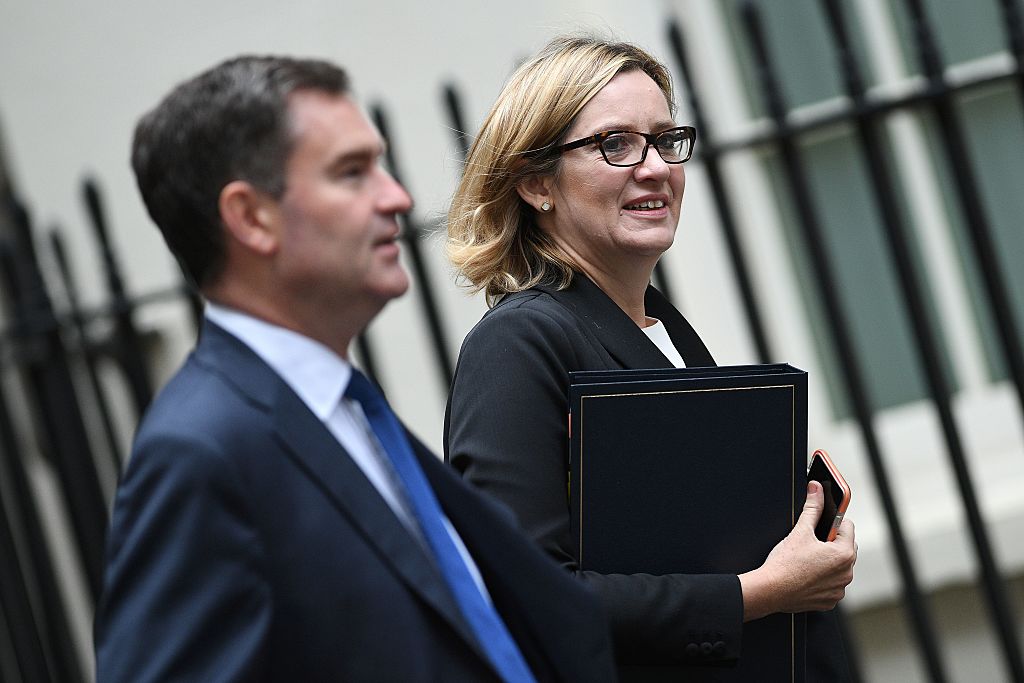There’s a useful rule of thumb in politics. When Conservative politicians pronounce themselves to be a One Nation Tory, you can be pretty sure they’ve got nothing sensible to say. Instead of addressing voters, they’re conversing with each other in a special form of Tory code. It’s an identifier without substance, a form of ritualistic preening often seen in the animal kingdom.
Amber Rudd was at it last week. Claiming that the economy was her top priority, Rudd said she would oppose any Conservative leadership candidate who wanted to cancel HS2. The timing was unfortunate, with the House of Lords Economic Affairs Committee subsequently producing a report recommending the government think again on HS2. Costs are out of control and no one knows what the final price tag will be. Making the case for the Conservatives at the European elections, the work and pensions secretary delivered a diatribe of despair and negativity. ‘We should expect a higher level of debate,’ she scolded. ‘We must be bold and be courageous, take on the falsehoods and take on the haters.’
Every rule has an exception and in this case it is David Gauke, the Justice Secretary. Unlike most One Nation Tories who are happiest talking about anything other than the economy, Gauke understands that Conservatives must win the economic debate.
‘The economy should be at the heart of the centre right’s case to the electorate,’ Gauke said in a speech to Onward. ‘A focus upon creating prosperity is an approach that more often unites rather than divides the Conservative Party,’ is the slightly tepid way Gauke frames the political case for economic growth.
But that is about as far as it goes. Other than pouring cold water on tax cuts – the tried and tested Lawsonian way of making tax reform popular – Gauke offered little in the way of enlightenment as to what these economic polices might be, even in their vaguest form.
The reason is not hard to find. As Stian Westlake has argued, the hard truth is the government doesn’t have an economic policy. To misquote Keith Joseph, balancing the budget is not enough. There is no programme of pro-growth, micro-economic policies similar to the supply side, deregulatory reforms of the 1980s and 1990s. When your principal economic policies are building HS2 and decarbonising the economy, you have counted yourself out of the prosperity-making business. And if you claim that raising living standards is your priority, you are going to end up disappointing an awful lot of voters
So it’s hardly surprising that One Nation Tories have a big problem with populism. In Gauke’s telling, Margaret Thatcher was one of us when it comes to his dislike of populism. Her success in turning around the economy was based on being an anti-populist. ‘She did so not by embracing populism but by confronting it,’ Gauke claims. The implication is that Margaret Thatcher was some kind of bloodless technocrat who knew better than the people she represented.
Nothing could be farther from the truth. She always knew where she came from and never turned her back on her natural supporters and was unembarrassed that their values were her values.
In a perceptive piece on the anniversary of her becoming prime minister, George Trefgarne writes that Margaret Thatcher would have known exactly what is wrong with the current Conservative party. ‘It has forgotten who its people are and what it stands for.’
The gap between the real Thatcher reality and Gauke’s revisionist version can be seen on immigration and culture. Acknowledging that sections of British society resent the disappearance of the culture they grew up with, Gauke sees this development as overwhelmingly positive. A year before becoming prime minister, Thatcher gave a famous TV interview when she talked about immigration in very different terms. ‘People are really rather afraid that this country might be rather swamped by people with a different culture,’ she told Granada’s World in Action. Even Nigel Farage couldn’t say that nowadays.
As political strategy, fighting populism is a formula for certain defeat. Thatcher’s three election victories show how successful Conservative leaders can co-opt populism for conservative ends. Thus the flourishing of popular capitalism and wider share ownership, of council house sales and of having a ‘retail offer’ of tax cuts at election time, something sorely lacking in the 2017 election.
The main function of One Nation Tories used to be in providing the Conservative party with ballast. In the demotic politics of 2019, where the Brexit Party can go from nought to overtaking the Tories in a matter of weeks, they are like defenceless herbivores against a hungry predator.
The irony of One Nation Toryism is that it is really about belief in the existence of Two Nations, comprising the people on top like them and a great mass of voters whose views and values are to be handled with a pair of tongs. It’s snobbery without the class of yesteryear – exactly what Nigel Farage could have ordered as his ideal entrée.
Rupert Darwall is author of Green Tyranny






Comments